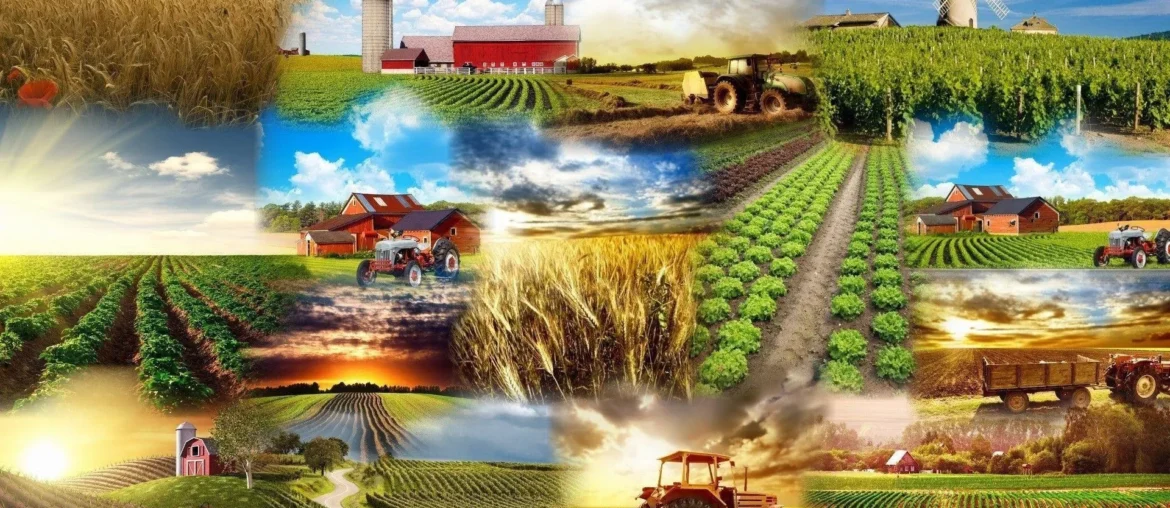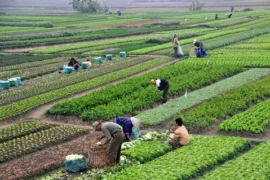Introduction
The agricultural sector, a cornerstone of global food security, faces unprecedented challenges today. With climate change, soil degradation, and resource scarcity posing significant threats, the need for sustainable practices has never been more urgent.
One of the most promising solutions lies in the use of environmental friendly polymers. These innovative materials are transforming traditional farming methods, offering new ways to enhance crop yields, protect the environment, and ensure long-term agricultural sustainability.
Environmental friendly polymers, derived from renewable resources or engineered to be biodegradable, are increasingly being integrated into various aspects of agriculture. From biodegradable mulch films to controlled-release fertilizers, these polymers are helping farmers reduce their environmental footprint while maintaining or even improving productivity.
In this post, we will explore how these polymers are revolutionizing sustainability in the agricultural sector, examining their benefits, applications, and potential future impacts.

The Role of Environmental Friendly Polymers in Soil Health
Soil health is fundamental to successful farming, and maintaining it is crucial for sustainable agriculture. Traditional farming practices often involve the use of synthetic chemicals and plastic products that can lead to soil degradation. However, environmental friendly polymers offer an alternative that promotes soil health and enhances agricultural productivity.
Enhancing Soil Structure and Water Retention
One of the key benefits of environmental friendly polymers is their ability to improve soil structure. Polymers such as hydrogels are used to increase soil water retention, ensuring that crops have a steady supply of water even during dry periods.
These polymers absorb and store large amounts of water, which can be slowly released into the soil, reducing the need for frequent irrigation. This not only conserves water but also minimizes soil erosion and runoff, contributing to healthier soil and more sustainable farming practices.
Biodegradable Mulch Films
Another significant application of green polymers in agriculture is in the production of biodegradable mulch films. Traditional plastic mulch, commonly used to suppress weeds and retain soil moisture, poses significant environmental challenges.
It can persist in the environment for hundreds of years, contributing to plastic pollution and harming soil organisms. In contrast, biodegradable mulch films made from environmental friendly polymers break down naturally in the soil, leaving no harmful residues. These films not only provide the same benefits as traditional mulch but also enhance soil organic matter as they decompose, further improving soil health.
Controlled-Release Fertilizers
Green polymers are also used in the development of controlled-release fertilizers. These fertilizers are coated with biodegradable polymers that regulate the release of nutrients into the soil, ensuring that plants receive the necessary nutrients over time.
This controlled release reduces the risk of nutrient leaching into water bodies, which can lead to environmental issues such as eutrophication. By minimizing nutrient loss and maximizing plant uptake, controlled-release fertilizers contribute to more efficient and sustainable agricultural practices.
Reducing Environmental Impact through Biodegradable Packaging
Packaging waste is a significant issue in agriculture, particularly with the widespread use of plastic containers, bags, and wraps. These materials, often used for seed storage, pesticide delivery, and food packaging, contribute to the growing problem of plastic pollution. However, the introduction of green polymers is offering a sustainable alternative that reduces the environmental impact of agricultural packaging.
Biodegradable Seed Coatings
Seed coatings made from environmental friendly polymers are becoming increasingly popular in the agricultural sector. These coatings protect seeds from pests and diseases while enhancing germination rates.
Unlike traditional coatings, which can contain harmful chemicals and microplastics, biodegradable seed coatings break down naturally in the soil, leaving no toxic residues. This not only benefits the environment but also supports healthier crop growth and higher yields.
Sustainable Food Packaging
Green polymers are also being used to develop sustainable food packaging solutions. Biodegradable films and containers made from these polymers offer a viable alternative to conventional plastic packaging.
These materials decompose in composting conditions, reducing waste and lowering the environmental impact of agricultural products. By adopting biodegradable packaging, the agricultural sector can significantly reduce its contribution to plastic pollution and move towards a more sustainable future.
Pesticide Delivery Systems
In addition to packaging, environmental friendly polymers are revolutionizing the way pesticides are delivered in agriculture. Traditional pesticide formulations often involve the use of non-biodegradable carriers that can persist in the environment, posing risks to non-target organisms and ecosystems.
However, biodegradable polymers are now being used to create more environmentally friendly pesticide delivery systems. These systems ensure that the active ingredients are released gradually and precisely, minimizing it contamination and enhancing the efficiency of pest control.
Promoting Sustainable Crop Production with Biopolymers
Sustainable crop production is at the heart of agricultural sustainability, and biopolymers play a critical role in achieving this goal. These polymers, derived from natural sources such as plants and microorganisms, are used in a variety of applications that support sustainable farming practices.
Biodegradable Plant Pots and Containers
One of the most innovative uses of biopolymers in agriculture is in the production of biodegradable plant pots and containers. These products are designed to be planted directly into the soil along with the plant, where they decompose naturally.
This eliminates the need for plastic pots, which can contribute to waste and pollution. Additionally, biodegradable pots made from environmental friendly polymers help improve soil structure and nutrient availability as they break down, supporting healthier plant growth.
Seed Encapsulation for Precision Agriculture
Precision agriculture, which involves the use of technology to optimize crop production, is another area where environmental friendly polymers are making an impact. Seed encapsulation, a technique used in precision agriculture, involves coating seeds with biopolymers that protect them from pests and diseases, enhance germination, and ensure uniform crop establishment. These coatings can also be designed to release nutrients and growth-promoting substances over time, further supporting sustainable crop production.
Biodegradable Crop Protection Materials
Environmental friendly polymers are also being used to develop biodegradable crop protection materials, such as nets and films, that shield crops from pests and environmental stressors. These materials provide an effective barrier while being fully biodegradable, reducing waste and its impact. As they decompose, they also contribute organic matter to the soil, promoting soil health and sustainability.
Future Prospects and Challenges
While environmental friendly polymers hold great promise for revolutionizing sustainability in the agricultural sector, there are still challenges to be addressed. The development and widespread adoption of these materials require continued research, investment, and collaboration between industry, academia, and government.
Economic Viability
One of the main challenges in the adoption of environmental friendly polymers is their economic viability. While these materials offer significant environmental benefits, they are often more expensive to produce than traditional plastics.
This cost difference can be a barrier for farmers and agricultural businesses, particularly in developing countries. However, as technology advances and production processes become more efficient, the cost of environmental friendly polymers is expected to decrease, making them more accessible to the agricultural sector.
Regulatory Support
Regulatory support is also crucial for the widespread adoption of environmental friendly polymers in agriculture. Governments and regulatory bodies can play a key role by creating policies and incentives that encourage the use of sustainable materials.
This could include subsidies for farmers who adopt biodegradable products, tax breaks for companies that develop and produce environmental friendly polymers, and stricter regulations on the use of traditional plastics in agriculture.
Public Awareness and Education
Increasing public awareness and education about the benefits of environmental friendly polymers is another important factor in their adoption. Many farmers and consumers are still unaware of the potential of these materials to enhance sustainability in agriculture. Educational campaigns, industry partnerships, and demonstration projects can help raise awareness and promote the adoption of environmental friendly polymers in the agricultural sector.
Research and Innovation
Finally, continued research and innovation are essential to overcoming the challenges associated with environmental friendly polymers. This includes developing new materials with improved properties, such as greater biodegradability, enhanced performance, and lower costs.
It also involves exploring new applications for these materials in agriculture, such as smart polymers that can respond to environmental changes and provide real-time feedback to farmers.
Conclusion
Environmental friendly polymers are at the forefront of a sustainability revolution in the agricultural sector. By enhancing soil health, reducing environmental impact, promoting sustainable crop production, and offering new solutions for packaging and pest control, these innovative materials are helping to create a more sustainable future for agriculture. However, realizing the full potential of environmental friendly polymers will require continued research, investment, and collaboration across the industry.
As we look to the future, it is clear that environmental friendly polymers have a critical role to play in addressing the challenges facing the agricultural sector. By embracing these materials, farmers, businesses, and consumers can contribute to a more sustainable and resilient agricultural system.
If you found this post informative or have any thoughts to share, we invite you to leave a comment below. Your feedback and insights are valuable as we continue to explore the potential of environmental friendly polymers in agriculture.





